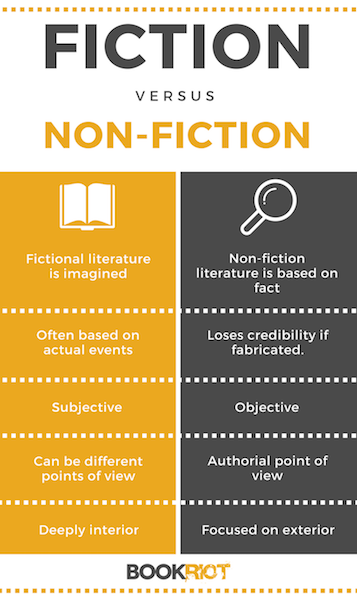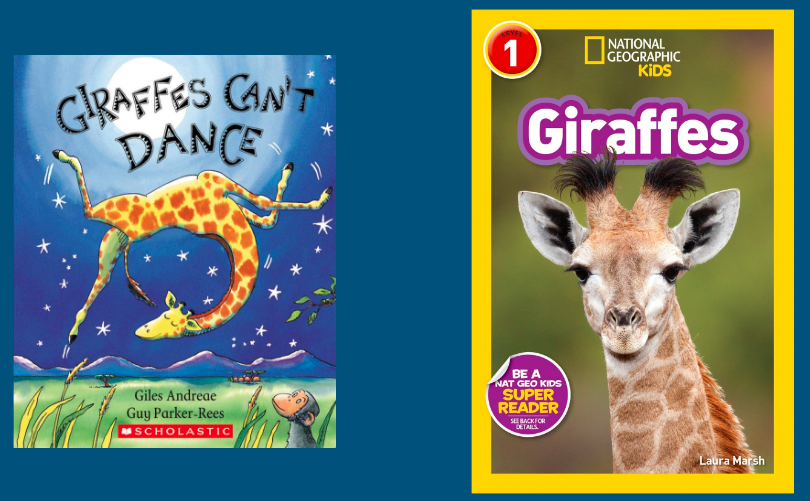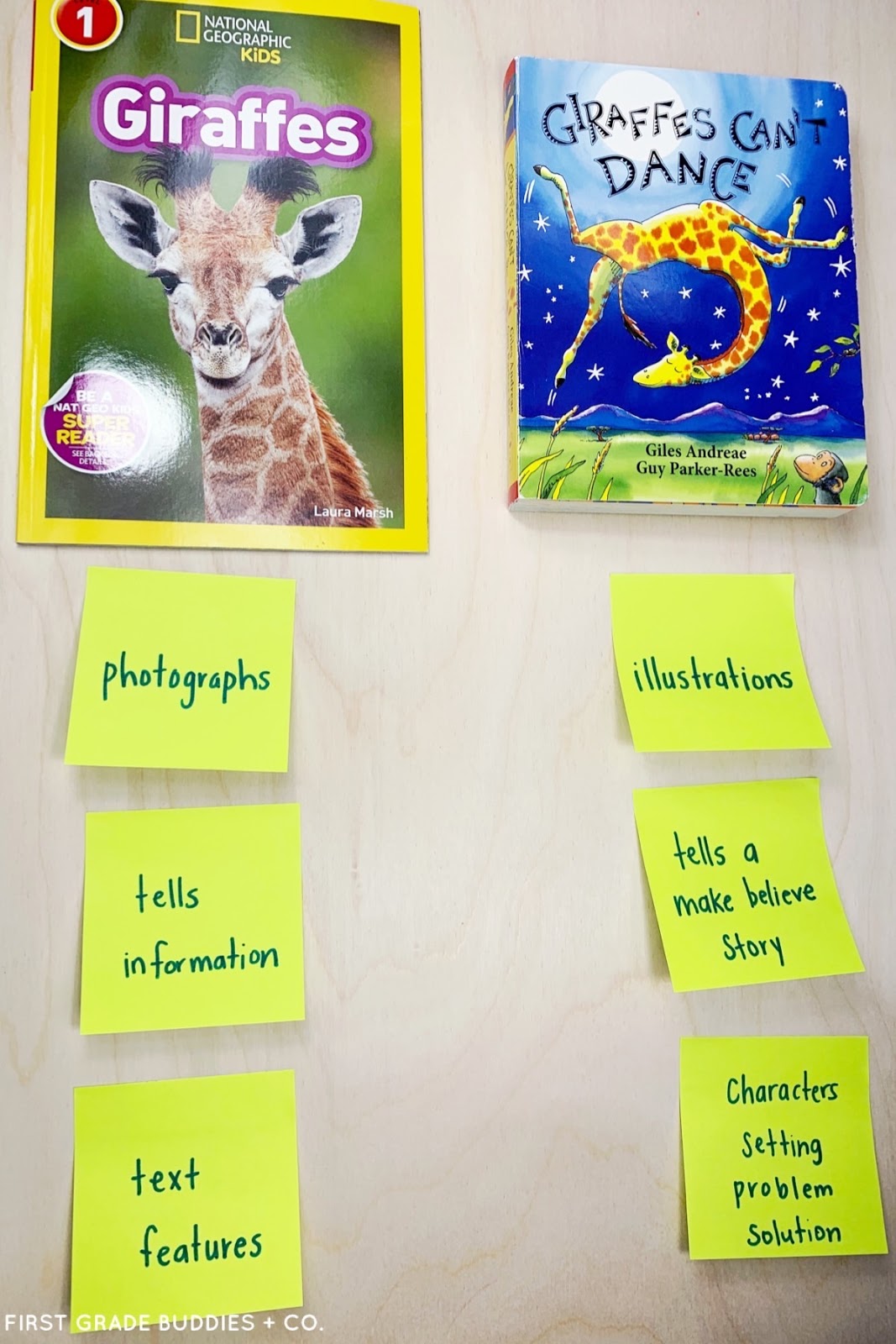Fiction Vs. Nonfiction Books
Fiction books are based on imaginary or invented stories, while nonfiction books are factual and based on real events or information. Readers often choose between fiction and nonfiction based on their interests, with fiction offering escapism and entertainment, and nonfiction providing knowledge and insight into real-world topics.
Whether it’s a thrilling novel or an informative biography, each genre has its own unique qualities and benefits. Both fiction and nonfiction books play an important role in shaping our understanding of the world and are vital to expanding our knowledge and imagination.
By exploring the differences between these two genres, readers can enhance their reading experience and broaden their literary horizons.

Credit: bookriot.com
1. Differences Between Fiction And Nonfiction
When it comes to choosing between fiction and nonfiction books, understanding the differences between the two can help readers make informed decisions. Each genre offers unique features and experiences, making them distinct from one another. In this blog post, we’ll explore the characteristics of fiction and nonfiction, providing insights into their definitions, themes, and appeals.
1.1. Definition Of Fiction
Fiction refers to narratives that are created by the author’s imagination rather than based on real events or people. These stories often involve invented characters and settings, allowing writers to explore diverse plots and themes. The genre encompasses various forms, including novels, short stories, and plays, presenting readers with imaginative realms and characters that may not exist in reality.
1.2. Definition Of Nonfiction
Nonfiction literature comprises works that are grounded in factual events, experiences, or information. This genre includes biographies, autobiographies, essays, and other forms of writing that aim to convey true stories or knowledge. Readers of nonfiction books seek to gain insights into real-life events, historical accounts, or educational subjects, often appreciating the informative and instructive nature of these texts.
2. Elements Of Fiction Books
Fiction books are known for their ability to transport readers to imaginative worlds, where characters and stories come to life. When exploring the elements of fiction books, we can uncover the creative techniques that authors use to captivate readers. From the creation of imaginary worlds to the development of compelling characters and intricate storytelling techniques, the elements of fiction books play a crucial role in delivering immersive and captivating narratives.
H3: 2.1. Creation of Imaginary Worlds2.1. Creation Of Imaginary Worlds
Imaginative worlds are a hallmark of fiction books, offering readers a chance to escape into realms of fantasy, magic, or futuristic landscapes. Authors use descriptive prose to construct these otherworldly settings, painting vivid pictures of places that exist only in the realm of imagination. By engaging readers’ senses and emotions, these imaginary worlds become as real to the reader as the world around them, fostering a sense of wonder and excitement.
H3: 2.2. Development of Characters2.2. Development Of Characters
Compelling characters are at the heart of fiction books, driving the narrative forward and forging deep connections with readers. Authors craft complex and multifaceted characters, imbuing them with emotions, motivations, and flaws that make them relatable and compelling. Through their journeys and growth, characters in fiction books become symbols of human experiences, evoking empathy and understanding from readers while adding depth to the overall story.
H3: 2.3. Storytelling Techniques2.3. Storytelling Techniques
Storytelling in fiction books encompasses a wide array of techniques, from narrative structures and point of view to the use of symbolism and allegory. Authors skillfully weave together plots and subplots, creating suspense, tension, and emotional resonance. Through the use of vivid imagery and figurative language, authors bring stories to life, enabling readers to immerse themselves in the narrative and experience the unfolding events as if they were right alongside the characters.
3. Elements Of Nonfiction Books
When it comes to nonfiction books, there are three key elements that set them apart from their fictional counterparts. These elements make nonfiction books a valuable source of information, providing readers with facts, evidence, and educational content.
3.1. Presentation Of Facts And Reality
Nonfiction books focus on presenting accurate information and portraying reality. They are designed to inform and educate readers about real-life events, people, places, and concepts. Unlike fiction, which relies on imagination and storytelling, nonfiction books adhere to a factual narrative. They provide readers with authentic and reliable knowledge, making them a valuable resource for those seeking to expand their understanding of the world.
3.2. Use Of Evidence And Research
In nonfiction books, evidence and research play a crucial role in supporting the presented facts. Authors delve deep into various sources, including academic studies, expert opinions, historical records, and personal interviews, to build a solid foundation for their content. By incorporating these sources, nonfiction books ensure that the information they provide is well-grounded and trustworthy. This meticulous attention to research and evidence distinguishes nonfiction books from fictional works, where creative storytelling takes precedence.
3.3. Informative And Educational
A significant objective of nonfiction books is to inform and educate readers. They go beyond entertainment and aim to broaden knowledge and understanding. These books cover a wide range of topics, from history and science to self-help and biographies, catering to diverse interests and curiosities. Nonfiction books help readers expand their intellectual horizons, nurturing a lifelong love for learning and discovery.
4. Purpose And Impact Of Fiction Books
Fiction books have a significant purpose and impact on readers, offering a wide array of benefits that go beyond simply providing entertainment. Whether you prefer to get lost in a captivating story or gain a deeper understanding of the human experience, fiction books have the power to transport, enlighten, and connect us in unique ways.
4.1. Entertainment And Escapism
Fiction books serve as a source of both entertainment and escapism for readers. In a world full of stress and responsibilities, losing yourself in a fictional narrative can provide a much-needed break and offer a temporary refuge from reality. These books immerse you in a different world, engaging your imagination and allowing you to experience thrilling adventures, magical realms, or romantic encounters from the comfort of your own living room.
4.2. Reflection On Human Experiences
Fiction books offer a valuable opportunity for reflection on various aspects of the human experience. Through the pages of a well-crafted novel or short story, we can explore complex emotions, moral dilemmas, and social issues. The characters and their journeys serve as mirrors, enabling us to examine our own beliefs, values, and experiences. Fiction allows us to step into different perspectives, encouraging empathy and expanding our understanding of the world around us.
4.3. Emotional Connection And Empathy
One of the most impactful aspects of fiction books is their ability to establish emotional connections between readers and characters. By creating relatable and authentic characters, authors evoke emotions and spark empathy within us. Through these connections, we become invested in the characters’ lives, their triumphs, and their struggles, allowing us to experience a wide range of emotions alongside them. This emotional connection enhances our capacity for empathy, helping us to better understand and connect with others in our own lives.
In summary, fiction books not only entertain and provide an escape from reality but also offer reflection on human experiences and foster emotional connections with characters. Each story we encounter has the potential to broaden our horizons, deepen our understanding, and inspire personal growth. So, pick up a fiction book, get lost in its pages, and discover the many ways it can impact your life.
5. Purpose And Impact Of Nonfiction Books
Nonfiction books play a significant role in our lives, offering much more than mere entertainment. As readers, we often turn to nonfiction books to acquire knowledge, develop ourselves personally, and explore real-world issues. In this section, we will delve into the purpose and impact of nonfiction books, focusing on three key aspects: acquiring knowledge and information, personal development and self-help, and the exploration of real-world issues.
5.1. Acquiring Knowledge and Information5.1. Acquiring Knowledge And Information
One of the primary purposes of nonfiction books is to provide readers with a wealth of knowledge and information. These books serve as invaluable resources, allowing us to expand our understanding of various subjects. Whether it’s a book about history, science, or any other field of study, nonfiction books enable us to delve deep into a specific topic and gain a comprehensive understanding of it.
Through meticulous research, authors of nonfiction books present facts, figures, and real-life examples to support their arguments and educate readers. These books are like portals to new worlds, unlocking valuable insights and serving as a repository of human knowledge. By reading nonfiction books, we have the opportunity to become more informed individuals and broaden our perspectives on the world.
5.2. Personal Development and Self-Help5.2. Personal Development And Self-help
Nonfiction books also play a crucial role in personal development and self-help. They offer practical guidance, insights, and strategies to help individuals improve various aspects of their lives. These books often provide step-by-step instructions, exercises, and real-life examples, giving readers the tools they need to overcome challenges and achieve personal growth.
Whether it’s a book on time management, emotional intelligence, or mindfulness, nonfiction books provide actionable advice and empower readers to make positive changes in their lives. By immersing ourselves in the pages of these books, we can gain valuable insights from experts in their respective fields and apply these learnings to our own lives.
5.3. Exploration of Real-world Issues5.3. Exploration Of Real-world Issues
Another purpose of nonfiction books is to provide a platform for the exploration of real-world issues. These books delve into complex topics such as social issues, politics, and environmental concerns, shedding light on various perspectives and fostering critical thinking.
By reading nonfiction books that tackle real-world issues, we expand our understanding of the world around us and become more socially aware individuals. These books encourage us to question the status quo, challenge existing beliefs, and consider alternative viewpoints. Through their thought-provoking narratives, nonfiction books inspire us to take action, promote positive change, and contribute to a better society.

Credit: intothestacks.tumblr.com

Credit: m.youtube.com
Frequently Asked Questions On Fiction Vs. Nonfiction Books
What Is The Difference Between Fiction And Nonfiction Books?
Fiction books include imaginary stories, while nonfiction books are based on real facts and information. Fiction uses imagination to entertain, while nonfiction provides knowledge and explores real-life events or topics.
What Is Fiction And Non Fiction With Examples?
Fiction is imaginary, not real, like “Harry Potter”. Non-fiction is real, like “Steve Jobs’ biography”.
Which Books Are True Fiction Or Nonfiction?
Fiction books contain imaginary stories, while nonfiction books present factual information and real events.
Conclusion
When it comes to choosing between fiction and nonfiction books, one must consider their preferences, interests, and goals. Both genres offer unique advantages and can cater to different intellectual needs. Fiction books provide an escape into imaginative worlds, while nonfiction books offer valuable knowledge and insights.
Ultimately, the choice depends on the reader’s personal inclination and desire for entertainment or enlightenment. So, whether you’re a lover of thrilling narratives or a seeker of factual information, the wonderful world of books has something for everyone. Explore, immerse, and enjoy the journey!






